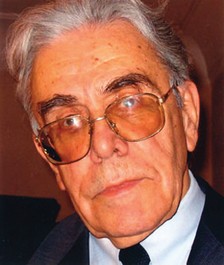
Dejan Despić (1930, Serbia), composer, author on music, theorist, and pedagogue. He studied composition with Marko Tajčević and conducting with Mihailo Vukdragović at the Music Academy in Belgrade, where he graduated from both departments in 1955. He taught subjects in music theory at the Mokranjac School of Music (1955–1965) and then at the Music Academy in Belgrade (1965–1995). In 1985, he was admitted to the Serbian Academy of Sciences and Arts as a corresponding member and in 1994 as a full member. He has composed over 170 pieces in a variety of genres, especially in concertante and chamber genres. He has received many prizes and awards, including at the International Review of Composers, a number of awards presented by the Composers’ Association of Serbia, JRT, Radio Belgrade, SOKOJ, and the 2005 Mokranjac Award for his Diptih op. 166 (Diptych, Op. 166) for English horn and chamber orchestra.
His works have been performed at every festival in Serbia and at many musical centres in Europe and the United States.
Diptih op. 166 (Diptych, Op. 166) for English horn and chanber orchestra. Here is the jury’s wording of their decision:
‘In Dejan Despić’s rich creative oeuvre, the concertante genre stands out by the sheer number and interest of its representatives, because the composer often uses it to address non-standard ensembles, searching out their specific sonorities (Concertino for clarinet, bassoon, and orchestra, Divertimento concertante for French horn, trumpet, and orchestra, Concerto grosso for flute, oboe, clarinet, bassoon, and orchestra), although he has also composed for standard performing ensembles (Concertino for two flues and chamber orchestra, Concerto for piano and orchestra, Concerto for Nataša). The 2005 concert of his works at the Atrium of the National Museumpremièred two extremely interesting concertante works: Dosta je već… rečitativ, koral i varijacije na jednu temu Feliksa Mendelsona (Enough Already… Recitative, Chorale, and Variations on a Felix Mendelssohn Theme) for two violoncellos and string orchestra, Op. 141 (1999) and Diptih op. 166 for English horn and chamber orchestra (2004). The jury was faced with the thankless task of having to single out only one of these rather successful pieces. In the end, the prize was awarded to the Diptih, whose brightness and dynamism are disarming and captivating, taking the listener into their condensed world of a musical dialogue between the soft, warm sonority of the English horn and chamber string orchestra. The freshness and directness of this piece are a genuine representative of Despić’s compositional writing.’


